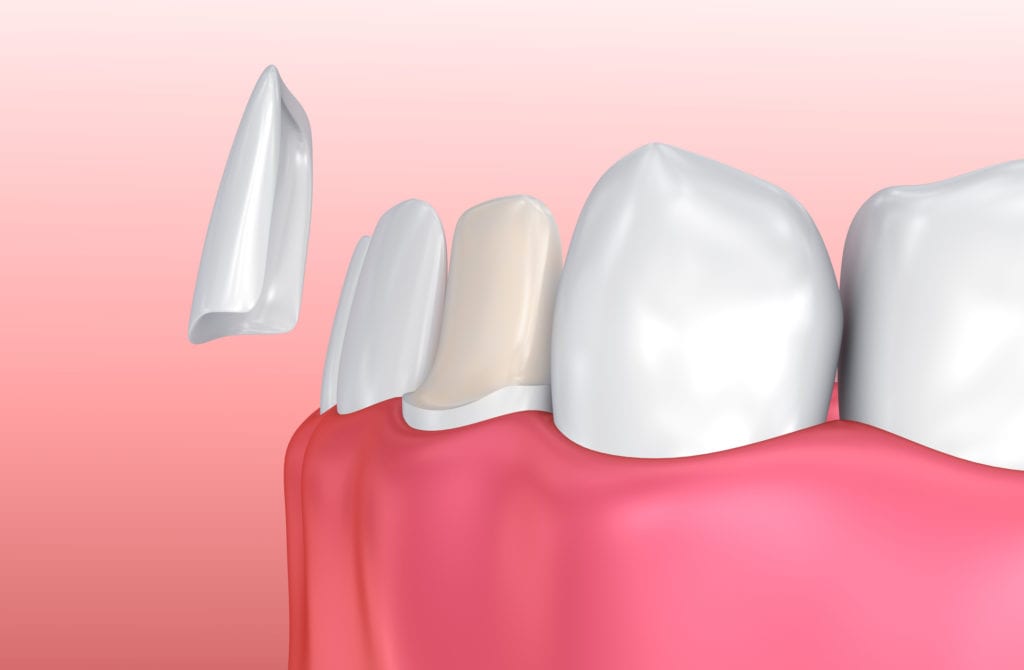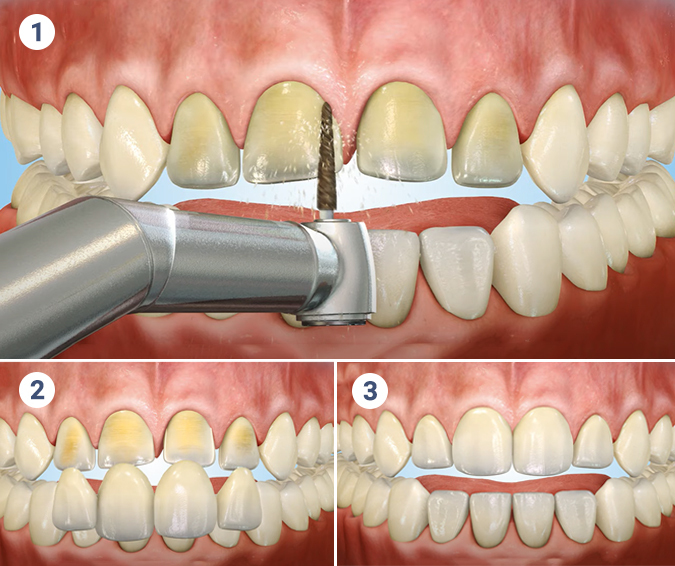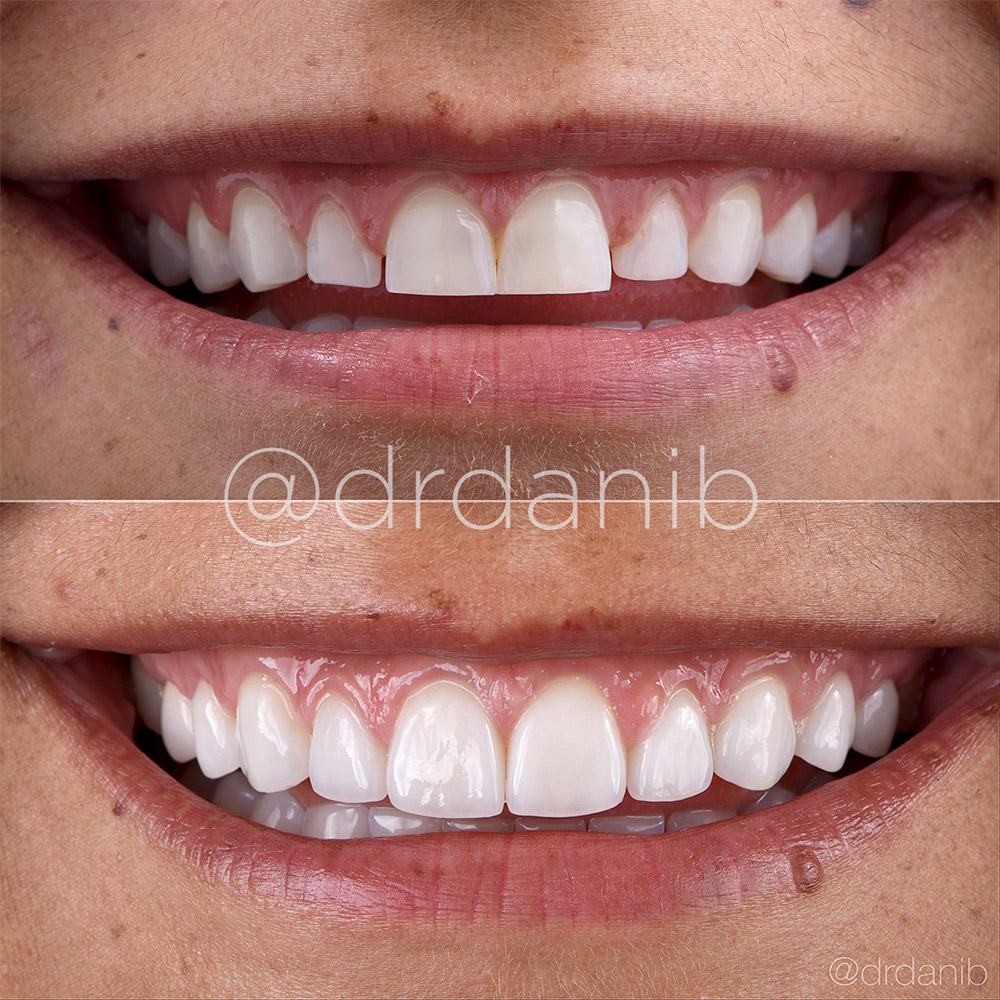Dental Veneers 101: A Step-By-Step Guide to a Flawless Smile
Unlocking the Tricks of Veneers: Facts, Kinds, and Benefits for a Beautiful Smile
Veneers provide an engaging service for those seeking to boost their smiles. These oral improvements can address different flaws, from staining to imbalance. With choices like porcelain and composite, individuals can select based on their needs and preferences. However, recognizing the nuances of veneers, consisting of application and care, is important. What variables should one think about prior to choosing? The solutions may surprise those thinking about this aesthetic dental option.

Recognizing Veneers: What Are They?
Veneers are thin, customized shells created to cover the front surface area of teeth, boosting their appearance. Usually crafted from sturdy materials, these shells are customized to fit each individual's teeth specifically. They offer several objectives, consisting of remedying aesthetic imperfections such as staining, chips, or spaces. The application process entails a dental practitioner preparing the teeth, usually by removing a small quantity of enamel to assure a snug fit. Once prepared, the veneers are bonded to the teeth making use of a strong adhesive.
People often choose veneers for their capability to develop a natural-looking smile while offering a long-lasting service to oral imperfections. Unlike other cosmetic dentistry alternatives, veneers call for minimal intrusive procedures, making them a prominent choice. The result is an improved smile that can substantially boost an individual's self-confidence and self-esteem. On the whole, veneers offer an efficient strategy to attaining an extra eye-catching and harmonious oral appearance.
Sorts of Veneers: Porcelain vs. Compound
When considering aesthetic oral alternatives, two main types of veneers stand apart: porcelain and composite. Porcelain veneers are crafted from a long lasting ceramic material that mimics the natural look of teeth. They are known for their tarnish resistance and capability to show light in a similar way to natural enamel, providing an aesthetic allure that many individuals need. The application process usually involves even more preparation of the tooth structure and might require several brows through to the dentist.
On the various other hand, composite veneers are made from a tooth-colored resin that is straight put on the teeth. This kind permits quicker application and can frequently be finished in a single visit. While they are less costly than porcelain veneers, they may not offer the exact same durability or resistance to discoloration. Eventually, the choice between porcelain and composite veneers depends on specific choices, budget plan, and specific oral demands.
The Advantages of Picking Veneers
Selecting veneers provides countless benefits that can considerably boost both the looks and capability of a person's smile. One of the key benefits is their ability to correct blemishes such as discoloration, spaces, and misalignment, resulting in a much more consistent appearance. Veneers can also boost the sturdiness of teeth, offering a safety layer that shields them from damage.
They require minimal tooth preparation contrasted to various other oral treatments, maintaining even more of the natural tooth structure. This preservation adds to a much healthier dental atmosphere while still accomplishing a stunning smile.
Veneers are highly adjustable, permitting people to pick the form, dimension, and shade that best fits their preferences. In addition, they are stain-resistant, making it easier to maintain a bright and eye-catching smile in time. Generally, veneers present a reliable choice for those seeking both cosmetic enhancement and long-lasting dental health and wellness benefits.
The Veneer Application Process
The veneer application procedure entails several essential steps to assure perfect results. An appointment is carried out to examine the person's needs, complied with by the prep work and shaping of the teeth. Lastly, the veneers are adhered in position, with modifications produced a best fit and appearance.
Initial Examination Tips
An extensive preliminary consultation is essential for any person thinking about veneers, as it sets the structure for a successful therapy. Throughout this conference, the oral specialist examines the individual's dental health and wellness, talking about any kind of existing issues that could impact the veneer application. This assessment may consist of X-rays and a visual exam to identify the condition of the gum tissues and teeth.
The dental practitioner also involves the person in an in-depth conversation regarding their aesthetic objectives, preferences, and assumptions. They may present different veneer choices customized to the individual's certain demands. Furthermore, the specialist clarifies the treatment, potential dangers, and aftercare needs, ensuring that the person is comfy and knowledgeable prior to waging the therapy.
Preparation and Forming Teeth
After the first appointment, the following phase includes the prep work and shaping of the teeth to fit the veneers. This essential action is executed by the dental expert, who thoroughly assesses the tooth structure to establish the amount of enamel that needs to be gotten rid of. Typically, a slim layer, typically around weblink 0.5 millimeters, is slashed off to assure an appropriate suitable for the veneers. Precision is critical throughout this process, as it impacts both the visual end result and the general convenience. When the teeth are sufficiently formed, perceptions are required to create custom-made veneers that line up completely with the individual's oral account. This precise prep work establishes the stage for an effective veneer application, boosting both appearance and feature.
Bonding and Last Modifications
Following the shaping and prep work of the teeth, the bonding procedure begins, noting an essential stage in the veneer application. Throughout this phase, a dental adhesive is related to the prepared tooth surface area, guaranteeing a strong bond between the veneer and the tooth. The dentist thoroughly positions the veneer, making changes to accomplish the preferred positioning and appearances. When correctly positioned, an unique light is used to cure the glue, strengthening the bond. After curing, the dental practitioner conducts last changes, cutting any type of excess material and fine-tuning the veneer's shape to ensure an all-natural look. This careful attention to information enhances both function and looks, adding to a total attractive smile that is durable and durable.
Taking care of Your Veneers: Maintenance Tips
Taking care of veneers is necessary to preserve their look and long life. A constant everyday cleansing regimen, conscious avoidance of tarnishing foods, and routine oral exams are essential parts of efficient maintenance. These techniques assist ensure that veneers stay in peak condition and remain to boost one's smile.
Daily Cleaning Routine
Consistently maintaining veneers is crucial for their longevity and appearance. A correct daily cleaning routine can assist preserve their sparkle and stop damages. Dentists advise brushing twice a day with a soft-bristled tooth brush and fluoride tooth paste, ensuring that all surface areas are cleaned carefully to avoid scraping the veneer surface area. Flossing daily is likewise crucial to get rid of food particles and plaque from between teeth, where brushes might not reach. Furthermore, utilizing an antimicrobial mouthwash can aid maintain oral health without hurting the veneers. It is recommended to stay clear important site of abrasive cleaners and devices that can damage the veneer. By adhering to these straightforward steps, individuals can maintain their veneers looking lovely while promoting total oral wellness.
Preventing Staining Foods
Although veneers are made to improve the look of teeth, their susceptibility to tarnishing demands cautious nutritional choices. It is essential for individuals with veneers to be conscious of particular foods and drinks that can result in staining. Dark-colored products such as coffee, red white wine, and berry juices should be consumed in small amounts, as they are recognized to tarnish both natural teeth and veneers. Furthermore, acidic foods like citrus fruits container compromise the bonding representatives utilized in veneers, making them much more susceptible to discoloration. To preserve a bright smile, it is a good idea to rinse the mouth with water after eating staining foods and to practice routine oral health. These thoughtful selections add substantially to the durability and aesthetics of veneers.

Normal Dental Check-ups

Maintaining the stability of veneers requires a commitment to normal oral check-ups, as these consultations play a vital function in guaranteeing their durability and appearance. Throughout these brows through, dental experts can assess the problem of the veneers, checking for any type of indications of wear, damages, or underlying dental concerns. Additionally, routine cleansings assist get rid of plaque and tartar that can collect around the veneers, advertising total dental wellness. Dental professionals can additionally offer individualized guidance on treatment techniques and items fit for veneer maintenance. By sticking to a schedule of examinations, people can deal with possible issues early, ensuring their smile continues to be attractive and vibrant. Inevitably, regular oral sees are a critical part of veneer treatment.
Is Veneers the Right Choice for You?
Choosing whether veneers are the right option usually rests on individual aesthetic objectives and dental requirements. For those looking for to deal with problems such as staining, chips, or misalignment, veneers can give a transformative service. Prospects usually include individuals with healthy and balanced teeth yet prefer an improved smile.
Nevertheless, it is essential to think about aspects such as tooth enamel problem, the degree of oral problems, and the desire to preserve veneers - Porcelain Veneers Dentist. Consulting with a dental expert is crucial, as they can review oral health and figure out if veneers are ideal
Furthermore, potential candidates must assess the long-lasting dedication, as veneers may call for replacement every 10-15 years. Cost considerations likewise play a substantial function, as veneers can be a considerable investment. Inevitably, the choice needs to be educated, stabilizing aesthetic needs with useful considerations for long-term results.
Regularly Asked Questions
For How Long Do Veneers Generally Last Prior To Requiring Replacement?
Veneers generally last between 10 to 15 years prior to requiring substitute. Aspects such as dental hygiene, way of living selections, and material top quality can influence their longevity, making normal dental check-ups important for maintaining their problem.
Are Veneers Safe for Individuals With Sensitive Teeth?
Veneers can be risk-free for individuals with delicate teeth, however it usually depends on the intensity of sensitivity and the dental expert's strategy. Consulting an oral professional prior to continuing is necessary to ensure ideal results.
Can Veneers Be Removed or Changed Quickly?

Do Veneers Spot With Time, and Just How Can I Prevent It?
Veneers can tarnish with time, especially from foods and drinks like coffee or merlot. To stop discoloration, maintaining good oral health, utilizing a straw for beverages, and regular dental cleansings are advised methods.
What Is the Cost Variety for Getting Veneers?
The price of veneers normally ranges from $500 to $2,500 per tooth, depending upon aspects such as material type, dental professional experience, and place. People should seek advice from dental experts for customized quotes and financing options.
Once the teeth are appropriately shaped, impacts are taken to create custom-made veneers that align completely with the individual's oral profile. Throughout this phase, a dental adhesive is applied to the prepared tooth surface, assuring a solid bond between the tooth and the veneer. It is vital to take right into account elements such as tooth enamel condition, the degree of oral issues, and the determination to keep veneers. Veneers can be safe for people with sensitive teeth, however it frequently depends on the severity of level of sensitivity and the dental expert's strategy. The cost of veneers generally useful link varies from $500 to $2,500 per tooth, depending on aspects such as product kind, dental professional experience, and place.